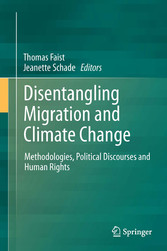Suchen und Finden
Disentangling Migration and Climate Change - Methodologies, Political Discourses and Human Rights
Mehr zum Inhalt

Disentangling Migration and Climate Change - Methodologies, Political Discourses and Human Rights
This book addresses environmental and climate change induced migration from the vantage point of migration studies, offering a broad spectrum of approaches for considering the environment/climate/migration nexus. Research on the subject is still frequently narrowed down to climate change vulnerability and the environmental push factor. The book establishes the interconnections between societal and environmental vulnerability, and migration and capability, allowing appreciation of migration in the frame of climate as a case of spatial and social mobility, that is, as a strategy of persons and groups to deal with a grossly unequal distribution of life chances across the world. In their introduction, the editors fan out the current debate and state the need to transcend predominantly policy-oriented approaches to migration. The first section of the volume focuses on 'Methodologies and Methods' and presents very distinct approaches to think climate induced migration. Subsequent chapters explore the sensitivity of existing migration flows to climate change in Ghana and Bangladesh, the complex relationship between migration, demographic change and coping capacities in Canada, methodological challenges of a household survey on the significance of migration and remittances for adaptation in the Hindu Kush region and an econometric study of the aftermath of the 1998 floods in Bangladesh. The second part, 'Areas of Concern: Politics and Human Rights', deepens the analysis of discourses as well as of the implications of proposed and implemented policies. Contributors discuss such topics as environmental migration as a multi-causal problem, climate migration as a consequence in an alarmist discourse and climate migration as a solution. A study of an integrated relocation program in Papua New Guinea is followed by chapters on the promise and the flaws of planned relocation policy, global policy on protection of environmental migrants including both internally displaced peoples and those who cross international borders. A concluding chapter places human agency at centre stage and explores the interplay between human rights, capability and migration.
Alle Preise verstehen sich inklusive der gesetzlichen MwSt.







